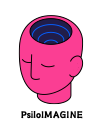An experimental medicine study of mental imagery re-scripting enhanced by psilocybin for young people who self-harm.
 Self-harming affects around 20% of young people aged 16-25 at some point in their lives. Many young people who self-harm often do so in response to struggling with difficult feelings, thoughts, and situations. The current treatments are long, costly, and do not suit all young people, being necessary to develop new interventions faster and are more accessible.
Self-harming affects around 20% of young people aged 16-25 at some point in their lives. Many young people who self-harm often do so in response to struggling with difficult feelings, thoughts, and situations. The current treatments are long, costly, and do not suit all young people, being necessary to develop new interventions faster and are more accessible.
Approximately 80% of oung people who self-harm experience self-harm-related mental images, often described as ‘seeing through the mind’s eyes’. These mental images influence emotions and motivation; for instance, it is possible that picturing something you desire make you feel better and encourage you to obtain it, whereas picturing something scary can also increase anxiety and discourage action.
Targeting self-harm mental images via a cognitive technique called “imagery re-scripting” (i.e. manipulating the mental image) has shown promise in reduce self-harm urges. However, it can be challenging and may require multiple repetitions. Some research suggests that low-dose psilocybin could make it easier and improve effectiveness.
Our study tests if adding a psychotic/low dose (5mg) of psilocybin before imagery re-scripting reduces the emotions, thoughts, and urges that come with self-harm-related mental images, compared to placebo. This is a double-blind, placebo-controlled study designed to explore a future psilocybin-augmented imagery re-scripting intervention.
Inclusion Criteria:
- Aged 16 to 25 years
- At least 2 lifetime episodes of self-harm
- Experience of self-harm-related mental imagery
- No previous experience with psychedelic substances
Exclusion Criteria:
- Current or past history of psychosis or mania (self or a first-degree relative)
- Current severe suicidal ideation that presents a risk for participation
You can find the protocol from PsiloIMAGINE study here.
Getting involved:
Your participation could make a difference!